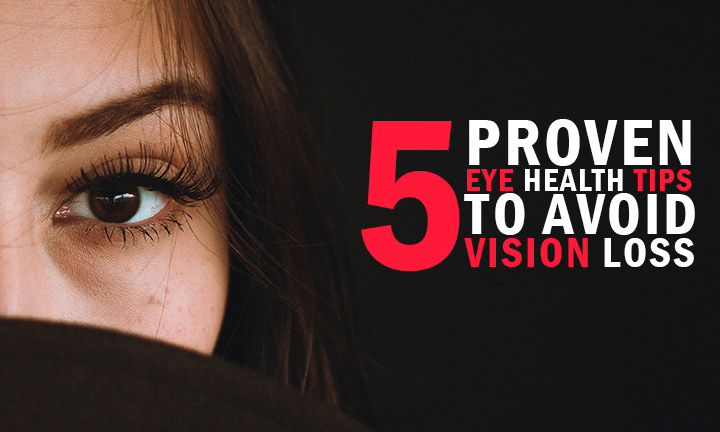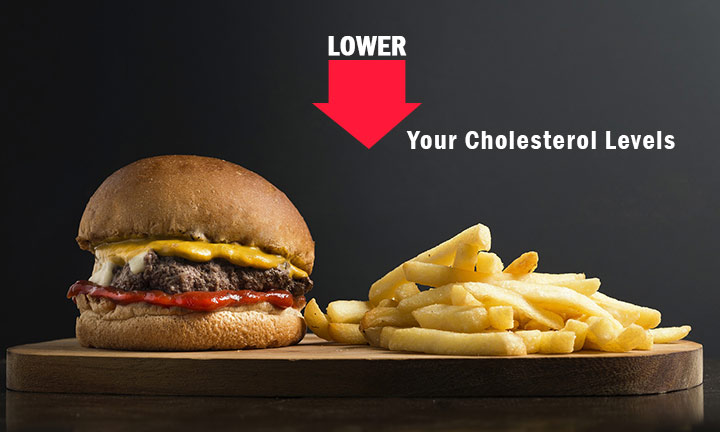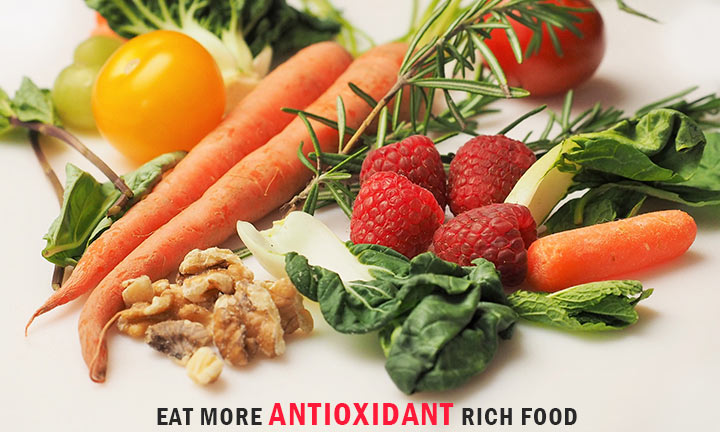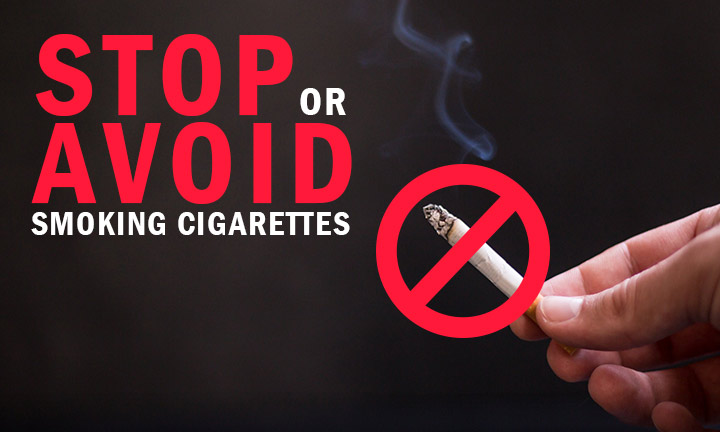13th, September 2019 | Oh Jinna
5 Proven Eye Health Tips to Avoid Vision Loss

We don’t get any younger and our bodies gradually give out on us as we get older. Additionally, vision loss and other eye problems are issues that most of us will have to face.
In fact, an article from the World Health Organization shows that around 1.3 billion people in the world are affected by vision impairments. But don’t worry, our eye health tips will help you improve your health and avoid future eye problems.
Additionally, these eye health tips are proven and tested through different case studies, literature, and research. And we’ve hand picked the right ones that highlight the benefits of eye health and eye disease prevention.
5. Lower Your Cholesterol Levels

Let’s start our eye health tips by looking at the negative effects of bad cholesterol. Our tip number 5 urges you to watch your cholesterol levels and reduce your saturated fat intake.
By now, you should at least know that high levels of cholesterol and saturated fat in your diet is bad for you health, right? However, you should also take note that these levels can also affect your vision.
Studies show that high levels of cholesterol and saturated fats in your diet can lead to age-related diseases. A good example of this type of disease is age-related macular degeneration.
Additionally, high levels of cholesterol and saturated fat in your bloodstream can lead to high blood pressure and diabetes. In fact, both of these also contribute to eye problems like retinal diseases.
Other eye risks from cholesterol and saturated fat include:
- Diabetic Retinopathy – is a condition caused by diabetes that can lead to blindness.
- Hypertensive Retinopathy – is an eye-damaging disease caused by high blood pressure.
- Hollenhorst Plaque – occurs when cholesterol plaque find their way into your eyes and cause a stroke inside your eye.
Read this article to find out about retinal detachment problems: A GUIDE TO RETINAL DETACHMENT TREATMENT.
Considering the bad effects of cholesterol and saturated fat, you can stay healthy by eating good food. Similarly, you can avoid health risks when you stop eating processed meals and fast food products.
You can also help your eye health by avoiding milk, butter, cheese or any other fatty dairy products. Additionally, you can also decrease your body max index (IBM) to enjoy a healthier body.
To do so, you need to exercise regularly, watch the food that you eat, and read on to learn more eye health tips.
4. Eat More Antioxidant Rich Food

The 4th of our eye health tips talks about eating more antioxidant rich foods. You can easily find antioxidant properties in fruits and vegetables, which also have lots of vitamins.
For example, you can get vitamin C, vitamin E, zinc, zeaxanthin, and lutein simply by eating fresh organic foods. By the way, lutein is a very strong eye-nutrient that you should get your hands on.
Read this article to find vitamin rich foods: THE BEST SOURCES OF VITAMIN E AND ZINC FOR THE EYES.
The nutrients that you get from fresh food can boost the processes that happen in your eyes. For example, taking vitamins can help your eyes to prevent diseases and keep itself as healthy as possible.
Additionally, your eyes never stop working when you’re awake. It constantly absorbs light from your environment which strains the photoreceptors in your retina.
As a result, your eyes need to constantly regenerate itself as you go about your day.
That process that your eyes constantly undergo requires an extremely high metabolism. As a result, the fast metabolism causes more amounts of reactive oxygen species that negate antioxidants.
In fact, it’s advisable to prescribe eye vitamins to patients with macular degeneration because of its effective results.
To sum it all up, tip number 3 simply means that you should eat lots of fruits and vegetables.
3. Add More Omega-3s in Your Diet

It may sound counter intuitive, but tip number 3 wants you to eat more fats. Yes, eating fats can also be part of our proven eye health tips.
However, you should focus on eating more “good” fats which are known as omega-3 fatty acids. You should know that omega-3 fatty acids are good fats that you can get from oily fish like salmon.
And like most eye health tips, you can also get omega-3 fatty acids from vegetables like nuts and seeds. In fact, there’s an algae-based supplement that you can take as an alternative to fish oil capsules.
Read this article if you want to avoid macular degeneration: 5 FOODS TO PREVENT MACULAR DEGENERATION.
A lot more people are acknowledging the positive effects of omega-3 fish oils. They believe it to be good for your heart, joints, and your neurological brain health.
In fact, there are plenty of literature that support how omega-3s can help with dry eyes and prevent retinal diseases.
Clinical studies consistently show that people high levels of omega-3s have a lower risk of developing age-related eye diseases.
Another study shows that people with diabetes but have high omega-3s are less prone to diabetic retinopathy.
Additionally, they also develop less severe forms of these diseases. Additionally, the same group also responded better to diabetic retinopathy treatment.
As can be seen, omega-3 fatty acids can really give a health boost to diabetics and nondiabetics alike.
2. Get Some Vitamins and Supplements

We’re finally down to number 2 of our proven eye health tips. Have you considered using vitamin supplements to boost your eye’s health? You should try taking eye supplements if you don’t always eat fruits, vegetables, or oily fish for omega-3s.
You can find lots of different vitamins in the market these days. In fact, you’ll be surprised with all the eye vitamin options available in stores. You’ll even find eye vitamins with the word Areds on the label.
Areds basically means that these vitamins are recommended and based on clinical studies for age-related eye diseases.
Areds are large-scale studies that prove and find the benefits that you get when you use eye vitamin supplementation. Additionally, these are primarily focused on diseases like age-related macular degeneration.
So, if you don’t have age-related macular degeneration, this type of formula won’t have much of an effect on you.
However, you can still find various eye vitamins that you can effectively use to supplement your eye health.
Read this article for a list of super health foods: TOP 17 MOST BENEFICIAL SUPERFOODS TO MAINTAIN GOOD EYESIGHT.
You can buy eye supplements that are specifically made to prevent age-related eye diseases. These eye supplements increase the Macular Pigment Optical Density (MPOD in your system.
As a result, it increases the structural support pigmented layer that’s located at the back of your eyes. This helps your eyes prevent age-related eye diseases.
Additionally, it reduces the damage that your eyes receive from high-energy light that the sun and your digital devices emit. Finally, you should always try to get nutrients from healthy foods before you take them from supplements.
After all, no supplement can ever beat the health benefits of natural, organic, and fresh food. But you can take supplements if you’re at higher risk of retinal problems or eye diseases.
Just remember to consult a medical professional before you start taking your supplements.
1. Stop or Avoid Smoking Cigarettes

Number one could possibly be one of the best eye health tips that you can get. Smoking causes a lot of overall health problems which is more problematic because it’s very addictive.
If you’re a smoker and you want to avoid eye problems, you should definitely stop smoking. However, if you don’t smoke, then you can simply stay away from people who do.
The smoke from cigarettes and tobacco can put your health at risks that include eye diseases like macular degeneration. Additionally, macular degeneration can decrease your vision and leave you blind.
Smoking can also lead you to more eye problems like dry eyes, uveitis, and thyroid eye disease. In fact, if your family has a history of thyroid problems, smoking can make your thyroid more severe.
Read this article if your vision is getting hazy: SIGNS YOU MIGHT HAVE EYE CATARACTS.
As bad as smoking may be to your health, you can see lots of people who currently practice this vice. Smoking should be taken seriously, since it’s a hard habit to kick despite all its bad reputation.
Currently, smoking boxes have warnings written directly on the boxes to warn people. However, even with these measures, smokers can still find it very hard to quit.
As a result, you should ask for professional assistance if you are having a hard time quitting smoking. They can give you counseling sessions as well as medications that can help you cope with withdrawals.
So take care of your body, and make sure to follow our top 5 eye health tips.
References:
Blindness and Vision Impairment
https://www.who.int/news-room/fact-sheets/detail/blindness-and-visual-impairment
Risk factors for the incidence of Advanced Age-Related Macular Degeneration in the Age-Related Eye Disease Study (AREDS) AREDS report no. 19.
https://www.ncbi.nlm.nih.gov/pubmed/15808240
{omega}-3 Long-chain polyunsaturated fatty acid intake and 12-y incidence of neovascular age-related macular degeneration and central geographic atrophy: AREDS report 30, a prospective cohort study from the Age-Related Eye Disease Study.
Dietary Marine ω-3 Fatty Acids and Incident Sight-Threatening Retinopathy in Middle-Aged and Older Individuals With Type 2 Diabetes: Prospective Investigation From the PREDIMED Trial.
https://www.ncbi.nlm.nih.gov/pubmed/27541690
A Guide to Retinal Detachment Treatment
5 Foods to Prevent Macular Degeneration
https://ohmylens.com/foods-to-prevent-macular-degeneration/
The Best Sources of Vitamin E and Zinc for the Eyes
Signs You Might Have Eye Cataracts
https://ohmylens.com/eye-cataracts-signs/
TOP 17 MOST BENEFICIAL SUPERFOODS TO MAINTAIN GOOD EYESIGHT

Leave a Reply
You must be logged in to post a comment.